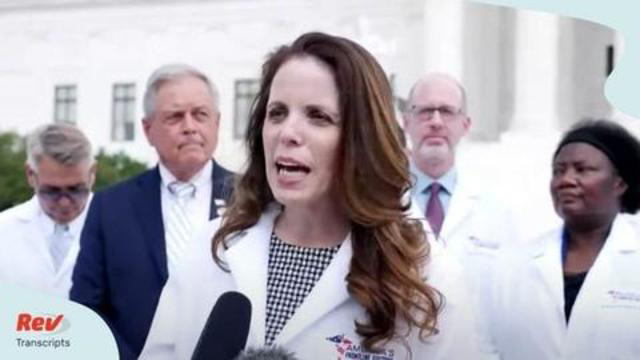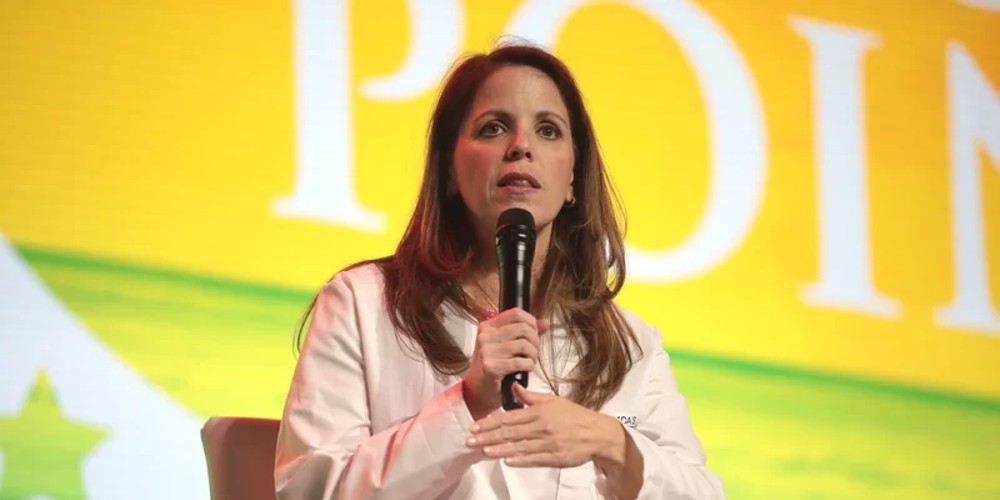Dr. Simone Gold, the founder of America’s Frontline Doctors who was jailed for 60 days for giving a speech on COVID-19 and medical freedom at the U.S. Capitol on Jan. 6, 2021, is being released from federal detention two weeks early.
Gold will be released from the Miami Federal Detention Center just in time for an 11 a.m. EDT news conference on Sept. 9, the 45th day of her incarceration. She will meet with reporters to discuss her experience behind bars and her plans for America’s Frontline Doctors (AFLDS).
“It feels like it’s Christmas Eve right now,” Lisa Andrzejewski, executive director of America’s Frontline Doctors, told The Epoch Times. “We cannot wait to see her tomorrow. We’re thoroughly ecstatic. We can’t wait. We’ve missed her greatly.”
Andrzejewski said Gold was given credit for teaching and taking classes while incarcerated. Along with credit for time served when she was arrested in January 2021, Sept. 9 became the release date, about two weeks before the 60 days would expire.
Gold kept a positive attitude during her incarceration, working on a book and other projects, Andrzejewski said.
‘Strong Like a Lion’
“She is strong like a lion,” Andrzejewski said. “She’s going to come out fighting like a lion. You can hear it in her voice today. She is ready. She is very enthusiastic about it. She can’t wait to get back to work.”

Gold—an emergency medicine specialist from Los Angeles—was sentenced on June 16 under a plea deal on one count of entering and remaining in a restricted building or grounds, a federal misdemeanor. The sentence, meted out by U.S. District Judge Christopher Cooper, included 60 days in jail, one year of supervised release, a $9,500 fine, and $500 of restitution.
Gold’s case was unusual because Cooper had asked her on a date when they were students at Stanford Law School in the early 1990s. She turned him down, something she said influenced the judge’s sentencing decision in her Jan. 6 case.
“The fact that I went to law school with this person and the fact that he didn’t recuse himself and then [what] he revealed during sentencing … I felt was such incredible bias,” Gold told The Epoch Times just before reporting for her jail sentence in late July.
At the sentencing hearing, Cooper read from a series of support letters that defended Gold for speaking her mind at the Capitol. “‘She is only guilty of having compassion and humanity,’ ” Cooper quoted from one letter.
Survival Beef on sale now. Freeze dried Ribeye, NY Strip, and Premium beef cubes. Promo code “jdr” at checkout for 25% off! Prepper All-Naturals
“All of that may be true, all right, but that’s not why we’re here, all right, and your organization is leading people to the misimpression that this is a political prosecution or is about free speech. It ain’t about free speech.”
Not About First Amendment
Jan. 6 “was about a lot of things, but it wasn’t about the First Amendment or COVID vaccinations,” Cooper said. “…The only reason you are here is where and when and how you chose to express your view.”
Gold was quarantined for eight days when reporting to the prison because she would not take the COVID-19 vaccine. She described the quarantine as solitary confinement. In an email from the prison in August, Gold described the quarantine as a “punishing and inhumane experience.”

The COVID jab is “the only so-called ‘vaccine’ in the world that has proven not to be able to stop transmission or infection, suggesting the ‘vaccine’ is a complete fraud perpetuated on the American people as well as medical and global communities,” America’s Frontline Doctors said in a Sept. 8 news release.
- Preserve your retirement with physical precious metals. Receive your free gold guide from Genesis Precious Metals to learn how.
As the medical establishment was pushing vaccines as the answer to COVID-19 in July 2020, Gold and a group of doctors held a press conference on the steps of the U.S. Supreme Court. They said successful early treatment medications such as hydroxychloroquine and ivermectin made the COVID vaccines unnecessary.
The video from the event was viewed by more than 24 million people, according to AFLDS, despite being censored and removed from social media platforms as so-called medical misinformation. Gold and the other Frontline Doctors were attacked in media outlets and by Dr. Anthony Fauci of the National Institute of Allergy and Infectious Diseases.
Andrzejewski said the timing of Gold’s release is perfect, as news continues to break about the dangers of the COVID vaccines and the efficacy of early treatment protocols like those AFLDS promoted two years ago.
Publicity surrounding Gold’s jail sentence and release will give her a bigger platform from which to promote medical freedom, Andrzejewski said.
“It’s giving her more of an advantage to do so, especially with everything that’s coming out now, how she basically was right,” Andrzejewski said. “We knew she was right, but they kept discrediting her. Everything’s coming out now and she’s ready for the fight.”
Nanette Holt, Meiling Lee, Enrico Trigoso, and Joshua Philipp contributed to this report. Article cross-posted from our premium news partners at The Epoch Times.

It’s becoming increasingly clear that fiat currencies across the globe, including the U.S. Dollar, are under attack. Paper money is losing its value, translating into insane inflation and less value in our life’s savings.
Genesis Gold Group believes physical precious metals are an amazing option for those seeking to move their wealth or retirement to higher ground. Whether Central Bank Digital Currencies replace current fiat currencies or not, precious metals are poised to retain or even increase in value. This is why central banks and mega-asset managers like BlackRock are moving much of their holdings to precious metals.
As a Christian company, Genesis Gold Group has maintained a perfect 5 out of 5 rating with the Better Business Bureau. Their faith-driven values allow them to help Americans protect their life’s savings without the gimmicks used by most precious metals companies. Reach out to them today to see how they can streamline the rollover or transfer of your current and previous retirement accounts.



